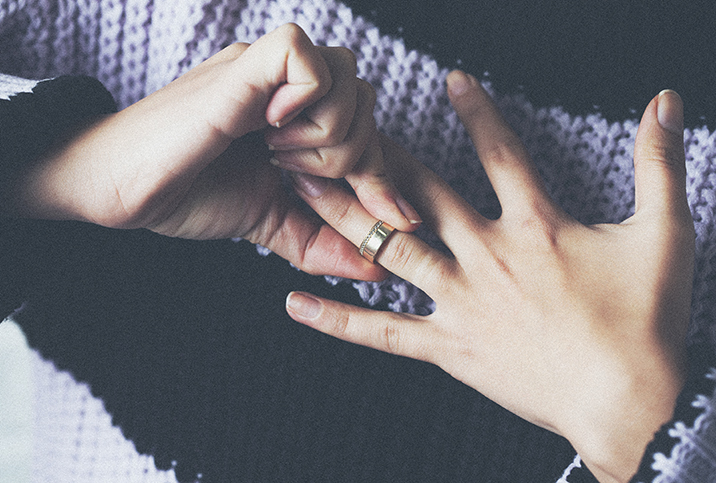Are Divorce Parties the Latest Trend?

Engagement party, wedding shower, bachelor(ette) party, the wedding ceremony itself, reception, honeymoon and—wait...divorce party?
While that may not be a fixture of everyone's fairy tale story, a quick Google search of the term unveils a class of events that are becoming increasingly common.
Divorce and separation are life-changing events. But instead of living with the shame and embarrassment of a failed partnership, new singles can embrace these new chapters in an effort to courageously reclaim autonomy and independence, and transform a serious turning point in their lives into a positive outcome.
Grey divorce
In a culture built on the expectation of a nuclear family—married, 1.93 kids, dog, a home in a nice neighborhood and a white picket fence—there's pressure to find a partner, any partner, and be happy and fulfilled from that relationship alone. Of course, this makes it easy to marry for the sake of being married, and that can easily collapse and end in divorce.
This might be a good point to interject and remind ourselves that around 50 percent of marriages in the U.S. end in divorce or separation.
A divorce party not only changes the perspective of the divorce itself, but also changes the perspective of the culture that probably created the problems in the first place. And divorce parties are not just something invented by the upcoming generation of younger changemakers: Even older couples are realizing lifelong marriage is not for them and are ready to start anew.
Andrea Hipps, LBSW, a certified divorce coach in Phoenix and author of "The Best Worst Time of Your Life: Four Practices to Get You Through the Pain of Divorce," certainly has a solid grasp on divorce trends.
A divorce party not only changes the perspective of the divorce itself, but also changes the perspective of the culture that probably created the problems in the first place.
"According to various studies, the number of new marriages is declining at a slow but steady rate," Hipps explained. "There have been reports that the divorce rate is at a [50]-year low overall, but the uptick we see in divorces is largely attributed to 'grey divorce,' or divorce happening in couples over age 55."
There could be all kinds of driving forces behind this trend. Of course, there's the thoroughly predictable midlife crisis, which makes a partner want to feel young and free again. But then it could be the realization that they were married too young and just maybe to the wrong person and for all the wrong reasons.
"There are a number of reasons that grey divorce rates are climbing," Hipps said. "There's definitely a group that is waiting until their children are out of the house to reevaluate and discern whether a meaningful future exists between partners at that time. I think longer life expectancy contributes to it a bit, as well as a wider variety of opportunities for women, in particular, to create income for themselves going forward. In some cases, there is also a spoken intolerance by one party to continue to relate in uncomfortable patterns and/or to continue feeling invisible in the relationship."
Divorce as a positive life event
When you dive deeper into the fun trend of divorce parties, the first thing to notice is society's growing destigmatization of divorce. Divorce now is more often being seen as a liberation worthy of celebration, especially if the former relationship was unhealthy or abusive.
The old belief that couples should stay together for the kids is also dying on the vine, as we now know that the best thing for children isn't necessarily a two-parent household—the key is stability and love. In fact, divorce can teach kids lessons on independence, strength, resilience, cooperation, conflict resolution and other adaptable life skills, as long as they're represented in the right context.
Elise Michaels, a mental health coach trained in trauma therapy and relationship science in Miami Beach, Florida, has a unique viewpoint on divorce's benefits for adults, too.
"In some instances, divorce can be a reclamation of self," Michaels said. "Sometimes we are too young or naive or we just change so much, and we no longer fit the container we're in. It's healthy to embrace a new part of life, a new part of who we are, and to not feel shame for leaving something that no longer fits you. I encourage my clients to use this time to look at needs they've neglected, to take care of themselves and to heal any wounds or patterns that might keep cropping up so they can enter the next relationship with different tools."
Sound advice for a separation
All of this is not to discount the serious emotional work that divorce requires or the very real grief that's created in its wake. Hipps emphasized that positive change won't come from a divorce party without work.
"The most important part of actuating that [rebuilding] in your life is to move from [the mindset of] a victim to [that of] a creator," Hipps said. "Yes, you may not have chosen divorce. You may not want it to have happened in this way. Despite that, asking yourself where you can start to bring creative energy to making something livable and even beautiful with your Act II experience is critical."
A divorce party provides just one way to embark on your new journey in celebration with those who support you and your newfound independence. However, before you call the party planner, make sure you are celebrating for the right reasons. Even after a separation is finalized, much more is involved in the healing process. But when you have healed a great deal, you've gotten in touch with your autonomy and you have the financial and social support to celebrate with—then the party can begin.
"Divorce is a team sport," Hipps said. "Don't go it alone, and don't lean too hard on your attorney for emotional and practical support. Pull in the right people with the right expertise, keep the long game in mind, and know that what you're breaking is always followed by a remaking."




















